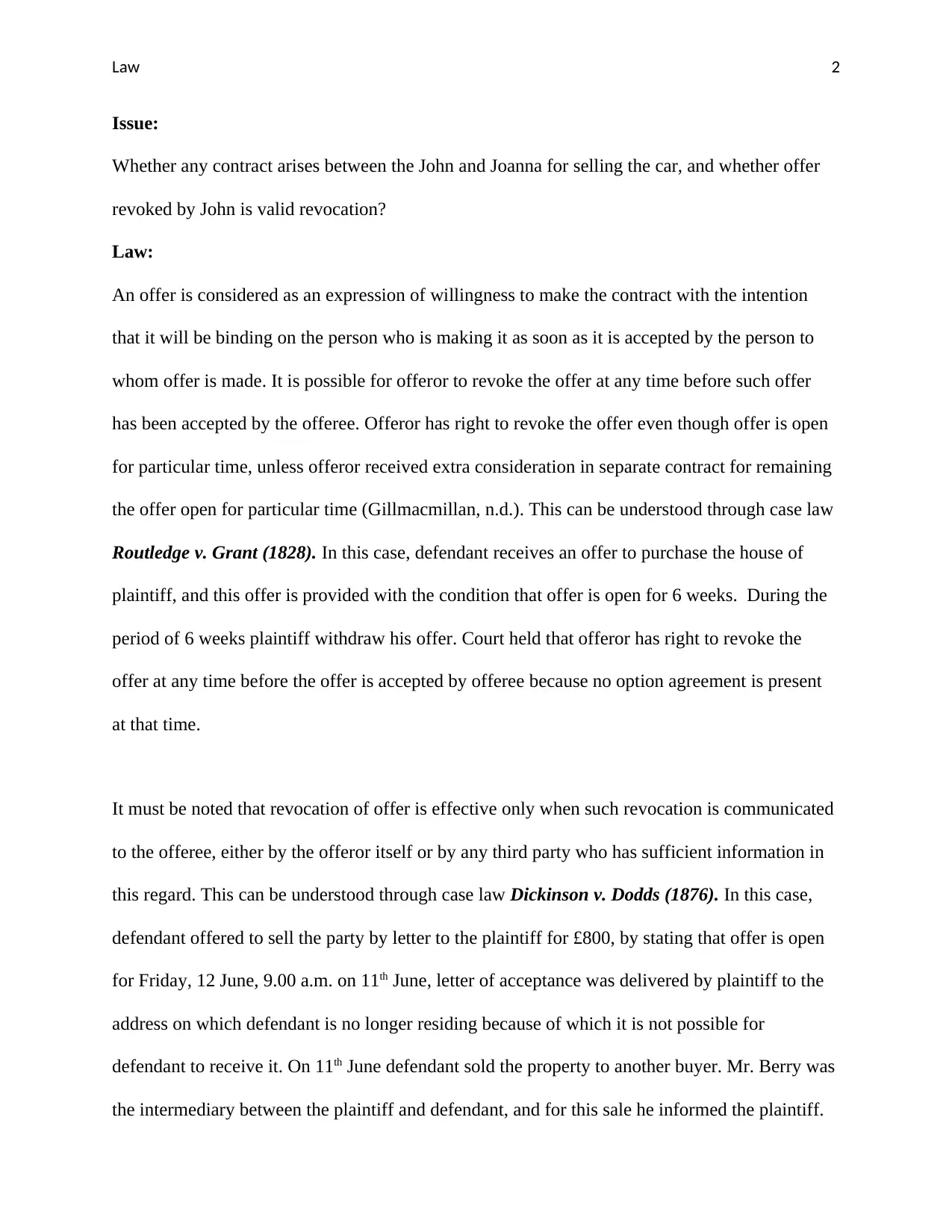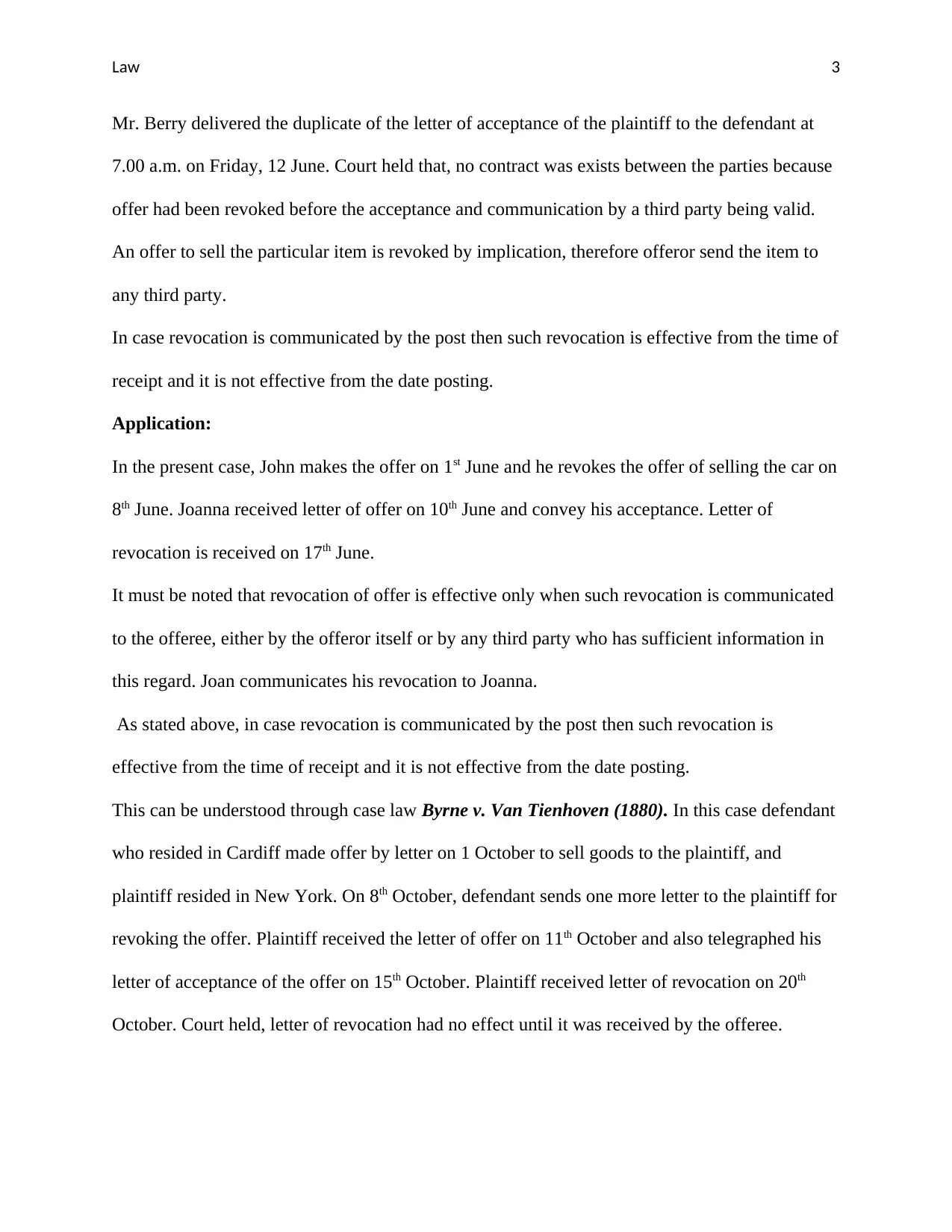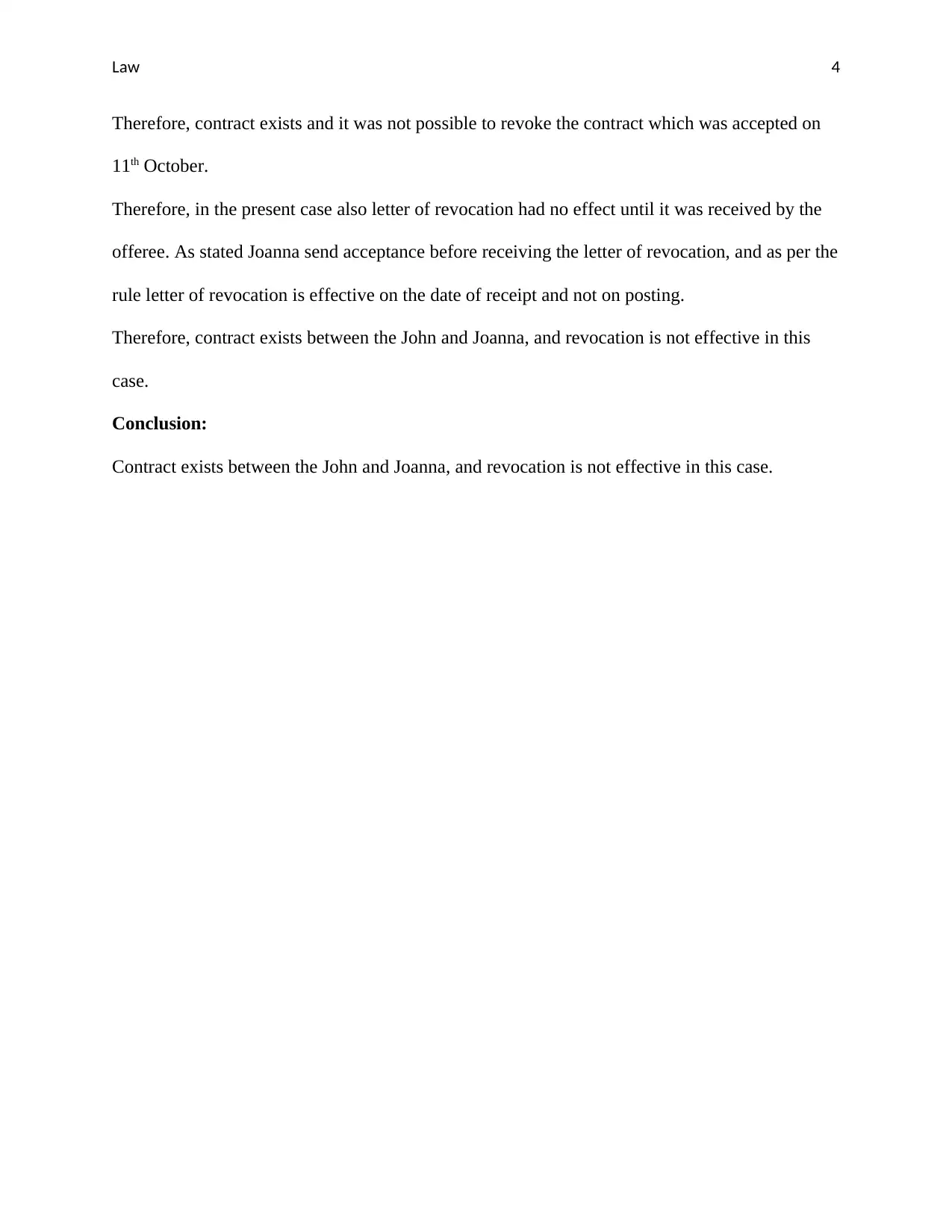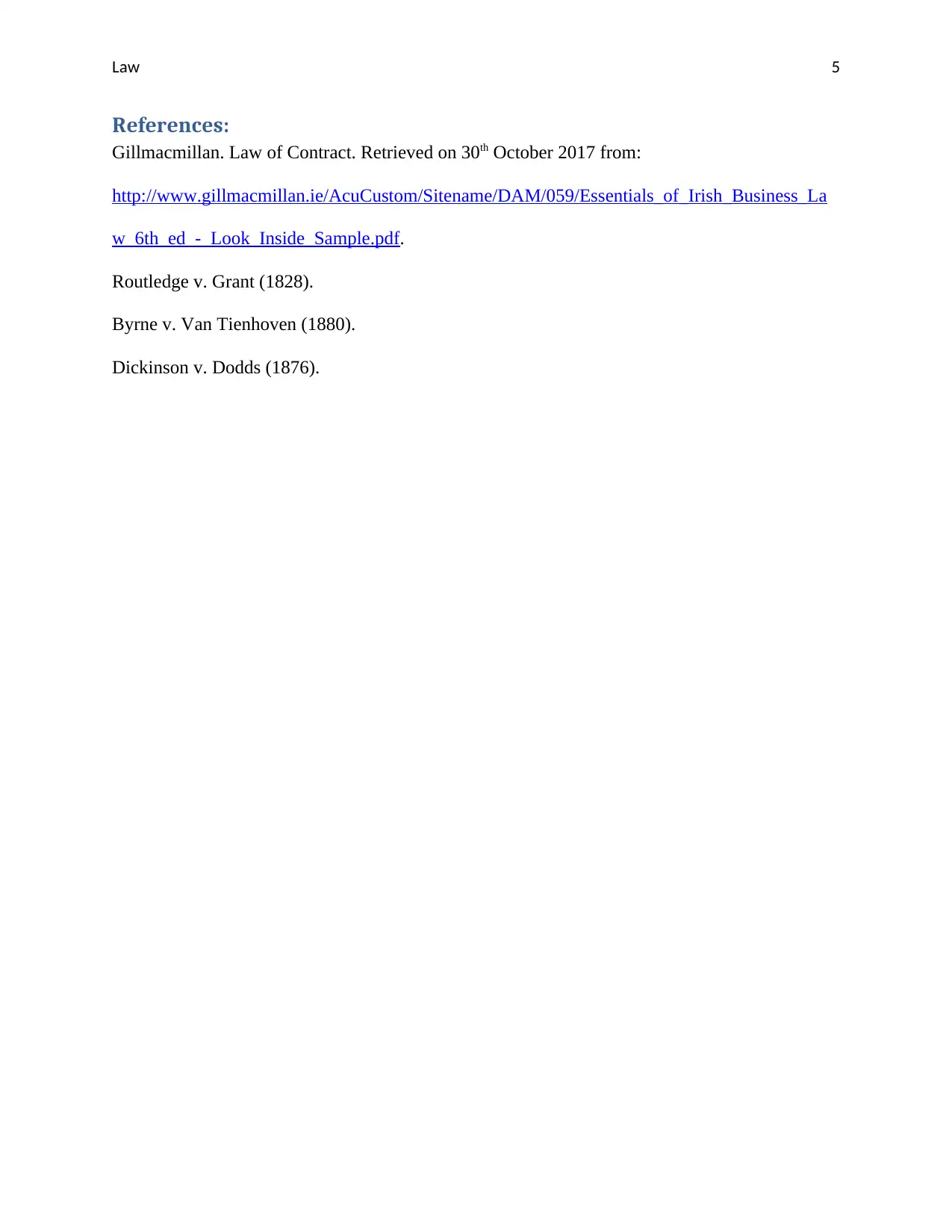Examining Contract Law Principles: John and Joanna's Car Sale Dispute
VerifiedAdded on 2020/05/04
|5
|865
|39
Case Study
AI Summary
This case study analyzes a contract law scenario involving John and Joanna and a car sale. The primary legal issue revolves around whether a valid contract was formed, considering the offer and subsequent revocation. The analysis delves into the principles of offer, acceptance, and revocation, referencing key case laws like Routledge v. Grant, Dickinson v. Dodds, and Byrne v. Van Tienhoven to support the arguments. The document examines the timing of the offer, revocation, and acceptance, emphasizing that revocation is only effective upon communication to the offeree. Based on the facts, the analysis concludes that a contract exists between John and Joanna, as the acceptance occurred before the effective revocation, making the revocation invalid.

Running Head: Law 1
Law
Law
Paraphrase This Document
Need a fresh take? Get an instant paraphrase of this document with our AI Paraphraser

Law 2
Issue:
Whether any contract arises between the John and Joanna for selling the car, and whether offer
revoked by John is valid revocation?
Law:
An offer is considered as an expression of willingness to make the contract with the intention
that it will be binding on the person who is making it as soon as it is accepted by the person to
whom offer is made. It is possible for offeror to revoke the offer at any time before such offer
has been accepted by the offeree. Offeror has right to revoke the offer even though offer is open
for particular time, unless offeror received extra consideration in separate contract for remaining
the offer open for particular time (Gillmacmillan, n.d.). This can be understood through case law
Routledge v. Grant (1828). In this case, defendant receives an offer to purchase the house of
plaintiff, and this offer is provided with the condition that offer is open for 6 weeks. During the
period of 6 weeks plaintiff withdraw his offer. Court held that offeror has right to revoke the
offer at any time before the offer is accepted by offeree because no option agreement is present
at that time.
It must be noted that revocation of offer is effective only when such revocation is communicated
to the offeree, either by the offeror itself or by any third party who has sufficient information in
this regard. This can be understood through case law Dickinson v. Dodds (1876). In this case,
defendant offered to sell the party by letter to the plaintiff for £800, by stating that offer is open
for Friday, 12 June, 9.00 a.m. on 11th June, letter of acceptance was delivered by plaintiff to the
address on which defendant is no longer residing because of which it is not possible for
defendant to receive it. On 11th June defendant sold the property to another buyer. Mr. Berry was
the intermediary between the plaintiff and defendant, and for this sale he informed the plaintiff.
Issue:
Whether any contract arises between the John and Joanna for selling the car, and whether offer
revoked by John is valid revocation?
Law:
An offer is considered as an expression of willingness to make the contract with the intention
that it will be binding on the person who is making it as soon as it is accepted by the person to
whom offer is made. It is possible for offeror to revoke the offer at any time before such offer
has been accepted by the offeree. Offeror has right to revoke the offer even though offer is open
for particular time, unless offeror received extra consideration in separate contract for remaining
the offer open for particular time (Gillmacmillan, n.d.). This can be understood through case law
Routledge v. Grant (1828). In this case, defendant receives an offer to purchase the house of
plaintiff, and this offer is provided with the condition that offer is open for 6 weeks. During the
period of 6 weeks plaintiff withdraw his offer. Court held that offeror has right to revoke the
offer at any time before the offer is accepted by offeree because no option agreement is present
at that time.
It must be noted that revocation of offer is effective only when such revocation is communicated
to the offeree, either by the offeror itself or by any third party who has sufficient information in
this regard. This can be understood through case law Dickinson v. Dodds (1876). In this case,
defendant offered to sell the party by letter to the plaintiff for £800, by stating that offer is open
for Friday, 12 June, 9.00 a.m. on 11th June, letter of acceptance was delivered by plaintiff to the
address on which defendant is no longer residing because of which it is not possible for
defendant to receive it. On 11th June defendant sold the property to another buyer. Mr. Berry was
the intermediary between the plaintiff and defendant, and for this sale he informed the plaintiff.

Law 3
Mr. Berry delivered the duplicate of the letter of acceptance of the plaintiff to the defendant at
7.00 a.m. on Friday, 12 June. Court held that, no contract was exists between the parties because
offer had been revoked before the acceptance and communication by a third party being valid.
An offer to sell the particular item is revoked by implication, therefore offeror send the item to
any third party.
In case revocation is communicated by the post then such revocation is effective from the time of
receipt and it is not effective from the date posting.
Application:
In the present case, John makes the offer on 1st June and he revokes the offer of selling the car on
8th June. Joanna received letter of offer on 10th June and convey his acceptance. Letter of
revocation is received on 17th June.
It must be noted that revocation of offer is effective only when such revocation is communicated
to the offeree, either by the offeror itself or by any third party who has sufficient information in
this regard. Joan communicates his revocation to Joanna.
As stated above, in case revocation is communicated by the post then such revocation is
effective from the time of receipt and it is not effective from the date posting.
This can be understood through case law Byrne v. Van Tienhoven (1880). In this case defendant
who resided in Cardiff made offer by letter on 1 October to sell goods to the plaintiff, and
plaintiff resided in New York. On 8th October, defendant sends one more letter to the plaintiff for
revoking the offer. Plaintiff received the letter of offer on 11th October and also telegraphed his
letter of acceptance of the offer on 15th October. Plaintiff received letter of revocation on 20th
October. Court held, letter of revocation had no effect until it was received by the offeree.
Mr. Berry delivered the duplicate of the letter of acceptance of the plaintiff to the defendant at
7.00 a.m. on Friday, 12 June. Court held that, no contract was exists between the parties because
offer had been revoked before the acceptance and communication by a third party being valid.
An offer to sell the particular item is revoked by implication, therefore offeror send the item to
any third party.
In case revocation is communicated by the post then such revocation is effective from the time of
receipt and it is not effective from the date posting.
Application:
In the present case, John makes the offer on 1st June and he revokes the offer of selling the car on
8th June. Joanna received letter of offer on 10th June and convey his acceptance. Letter of
revocation is received on 17th June.
It must be noted that revocation of offer is effective only when such revocation is communicated
to the offeree, either by the offeror itself or by any third party who has sufficient information in
this regard. Joan communicates his revocation to Joanna.
As stated above, in case revocation is communicated by the post then such revocation is
effective from the time of receipt and it is not effective from the date posting.
This can be understood through case law Byrne v. Van Tienhoven (1880). In this case defendant
who resided in Cardiff made offer by letter on 1 October to sell goods to the plaintiff, and
plaintiff resided in New York. On 8th October, defendant sends one more letter to the plaintiff for
revoking the offer. Plaintiff received the letter of offer on 11th October and also telegraphed his
letter of acceptance of the offer on 15th October. Plaintiff received letter of revocation on 20th
October. Court held, letter of revocation had no effect until it was received by the offeree.
⊘ This is a preview!⊘
Do you want full access?
Subscribe today to unlock all pages.

Trusted by 1+ million students worldwide

Law 4
Therefore, contract exists and it was not possible to revoke the contract which was accepted on
11th October.
Therefore, in the present case also letter of revocation had no effect until it was received by the
offeree. As stated Joanna send acceptance before receiving the letter of revocation, and as per the
rule letter of revocation is effective on the date of receipt and not on posting.
Therefore, contract exists between the John and Joanna, and revocation is not effective in this
case.
Conclusion:
Contract exists between the John and Joanna, and revocation is not effective in this case.
Therefore, contract exists and it was not possible to revoke the contract which was accepted on
11th October.
Therefore, in the present case also letter of revocation had no effect until it was received by the
offeree. As stated Joanna send acceptance before receiving the letter of revocation, and as per the
rule letter of revocation is effective on the date of receipt and not on posting.
Therefore, contract exists between the John and Joanna, and revocation is not effective in this
case.
Conclusion:
Contract exists between the John and Joanna, and revocation is not effective in this case.
Paraphrase This Document
Need a fresh take? Get an instant paraphrase of this document with our AI Paraphraser

Law 5
References:
Gillmacmillan. Law of Contract. Retrieved on 30th October 2017 from:
http://www.gillmacmillan.ie/AcuCustom/Sitename/DAM/059/Essentials_of_Irish_Business_La
w_6th_ed_-_Look_Inside_Sample.pdf.
Routledge v. Grant (1828).
Byrne v. Van Tienhoven (1880).
Dickinson v. Dodds (1876).
References:
Gillmacmillan. Law of Contract. Retrieved on 30th October 2017 from:
http://www.gillmacmillan.ie/AcuCustom/Sitename/DAM/059/Essentials_of_Irish_Business_La
w_6th_ed_-_Look_Inside_Sample.pdf.
Routledge v. Grant (1828).
Byrne v. Van Tienhoven (1880).
Dickinson v. Dodds (1876).
1 out of 5
Related Documents
Your All-in-One AI-Powered Toolkit for Academic Success.
+13062052269
info@desklib.com
Available 24*7 on WhatsApp / Email
![[object Object]](/_next/static/media/star-bottom.7253800d.svg)
Unlock your academic potential
Copyright © 2020–2026 A2Z Services. All Rights Reserved. Developed and managed by ZUCOL.



